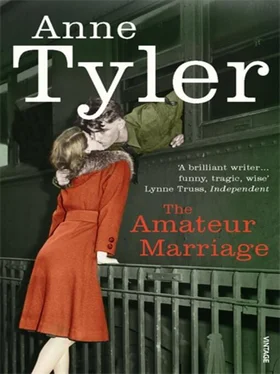“Did you take your pills?” Pauline asked her.
“I forgot! Thanks for reminding me.”
“I’ll fetch them. You sit still.”
“No, no! Stay where you are!”
Like partners in some elaborate dance, both women half-stood and appeared to curtsy to each other. Then Pauline sat back down and Michael’s mother rose all the way and shuffled out of the kitchen.
“I should have thought to remind her earlier,” Pauline told Michael. “It’s a whole lot easier to stave off pain than to cure it once it’s set in.”
Michael said nothing. He tore a bite-size piece from his slice of bread and set it on Lindy’s high-chair tray.
“But of course, you’d know that better than I would,” Pauline said. “Accustomed as you are to living with your hip.”
He was silent.
“Michael?”
“Try some bread, Lindy. It’s delicious,” Michael said.
“Michael, aren’t you going to talk to me?”
“Yum, bread. Can you say, ‘Bread’?”
Lindy grinned at him, showing two tiny bottom teeth coated green with mashed asparagus.
“Please don’t be this way, Michael. Can’t we make up?”
“Bread,” he told Lindy distinctly.
“I didn’t mean what I said, honest! It’s just I was feeling so under the weather. Michael, I can’t bear it when you’re mad at me!”
“I’m not mad at you,” he said. He was still facing the high chair; he seemed to be addressing the baby.
Pauline said, “You’re not?”
“I’m just fed up with you. I’m disgusted. I’m sick to death of you and your nasty disposition. I never should have married you.”
This time the silence was sharper — a sort of hole in the air of the kitchen.
Then his mother’s footsteps came fumbling out of her bedroom. “Found them!” she called in a loud, carrying voice.
She entered the kitchen holding aloft a blue cardboard pillbox from Sweda’s. Michael said, “Well, good,” and Pauline sat up straighter and asked, “You want something to take those with, Mother Anton?”
“No, thank you, dear, I still have my water,” Michael’s mother said, and she lowered herself into her chair.
Michael picked up his fork and resumed eating, but Pauline went on sitting motionless with her hands at either side of her plate.
When the meal was finished, Michael’s mother said she would do the dishes. “You two just clear out of here and go relax together,” she told them. But Lindy was fussing by then, which meant she was nearing her bedtime; so Michael said, “I’ll make up her bottle.”
“Oh, I can do that, dear. You two run along.”
As if she hadn’t spoken, he went over to the rack of sterilized bottles on the counter. His mother offered no further argument.
Pauline carried Lindy off to the bedroom to change her while Michael filled a bottle with milk and set it to heat in a pan of water on the stove. He stood with his arms folded and his feet planted wide apart and watched the water start to simmer. Behind him, his mother scraped plates and collected glasses. “Don’t let that get too hot,” she told him after a while, and he said, “Hmm? Oh,” and hastily plucked the bottle from the pan, burning his fingers. “Damn,” he said. For once, his mother didn’t comment on his language. He held the bottle under the sink tap while she stood back, and then he went off to the bedroom, shaking the bottle vigorously.
Nobody was there.
Lindy’s crib was empty. Her blanket hung crumpled over the railing. The rubber sheet that Pauline always spread on their bed before changing her was still folded on the bureau.
He crossed the hall to the bathroom. Nobody there either. He even poked his head into his mother’s little room, but of course they wouldn’t be there.
They must have used the outdoor stairs. Not the safe, sheltered indoor stairs at the rear but the rickety metal fire escape that ran down the Porter Street side of the building. Pauline must have climbed through the bedroom window onto the landing, which was an open grid, and carried a wet, hungry, sleepy six-month-old baby down the slick steps and into the cold winter night with a north wind blowing up and a promise of snow before morning.
He went back into the kitchen and set the bottle on the drain board. His mother, swishing a handful of cutlery through the rinse water, sent him a questioning look.
“I guess they’re taking a walk,” he said.
She stopped swishing the cutlery.
“Having a little stroll around the neighborhood before bedtime,” he said.
She said, “Ah.”
She placed the cutlery in the dish rack. Michael picked up a towel and began to dry the spoons, thoroughly polishing the bowl of each one before putting it away. When he got to the forks, he started humming under his breath in a jaunty, carefree manner. Then he noticed what the tune was: “People Will Say We’re in Love.” But it was too late to change it.
Oh, and her inconsistency; had he included that fault on his list? Her fickle, irresponsible unpredictability. How would Lindy learn what a proper bedtime was, if she was carted off into the night whenever Pauline took the notion? By now it was almost nine o’clock; they’d been gone for more than two hours. Children needed schedules. They needed routines.
Wandering back to the crib on one of his restless journeys, he took Lindy’s blanket from the railing and shook it straight and folded it. They needed neatness, too. You couldn’t raise a child in chaos and then expect her to view the world as a stable, secure place. They needed the edges matched and the corners squared. They needed to feel certain that things were where they belonged.
He heard his mother emerge from the bathroom, hesitate in the hall, and then proceed to her own room — her slow, vague footsteps in heavy shoes. He should go back out to wish her good night, but it required too much effort. He heard her door latch shut in a way that seemed to him reproachful and resigned.
Lindy’s blanket was one Pauline had sewn when she was pregnant, binding a length of pale-yellow wool with yellow satin on all four sides because, she said, babies loved to run their fingers across something smooth and slippery when they were trying to go to sleep. She somehow knew things like that. She knew that very young babies worried they’d fall apart; they liked to be wrapped into cylinders like stuffed cabbage leaves. She knew the level of voice they preferred — higher-pitched but not shrill — and she knew that while a swaying motion could be soothing, an up-and-down motion would cause a baby to stiffen every muscle.
Michael had no idea where she had learned all this. He suspected that she hadn’t learned it — that it came from a natural, inborn fund of empathy.
He laid the folded blanket at the foot of the crib. He adjusted the green cloth frog that sat at the head. It was Pauline’s frog, from her childhood. It had a faded, floppy, rubbed-bald look; you could tell it had been well loved. A gap at one corner of the stitched-on mouth turned its smile into a lopsided grin. The right arm had been reat-tached with brighter-green thread.
She was a rememberer and a saver and a compulsive souvenir keeper. She still had the red tin cricket from the box of Cracker Jack that he’d bought her on their first date. She had a cone-shaped paper cup, flattened now into a pie wedge, from the train they’d ridden on their honeymoon trip to Washington, D.C.
He circled the room, gathering further evidence of what kind of person she was. The laughing, affectionate faces of her friends in the snapshots tucked in the mirror. The fountain of maidenhair fern burgeoning on the windowsill. (She could grow anything, anywhere. Her victory garden in the backyard — a yard the size of a scatter rug! packed as hard as a pavement! — had produced so many vegetables last summer that they had had extras to sell in the store. Although half the time, she had spontaneously given them to the neighbors before Michael could collect them.)
Читать дальше












